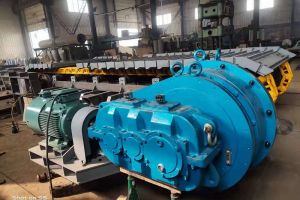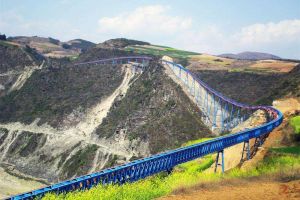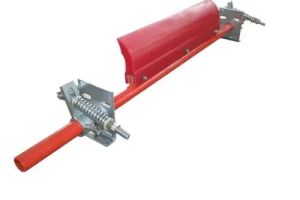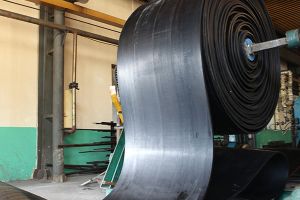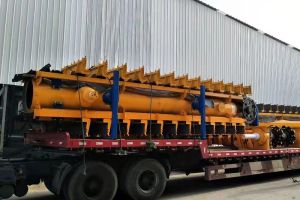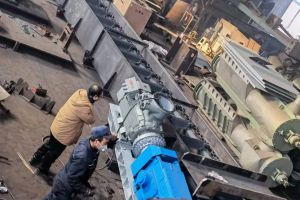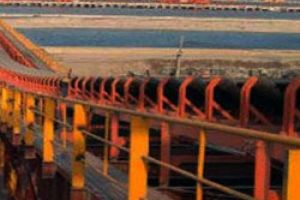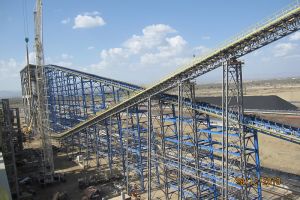News
-
Read More
What Advantages Do Apron Feeders Offer for High-Temperature Material Handling
In industries such as cement production, metallurgy, power generation, and mineral processing, material handling systems are often exposed to extreme heat. Moving hot clinker, sintered ore, slag, or furnace discharge requires equipment that can tolerate high temperatures without compromising safety or reliability. In these demanding environments, apron feeders have become a preferred solution due to their heat-resistant design and stable operating performance.
-
Read More
Why Are Apron Feeders Preferred for Heavy-Duty and Abrasive Materials
In mining, quarrying, and bulk material handling industries, equipment reliability directly affects productivity and operating costs. When it comes to moving heavy-duty and abrasive materials such as ore, limestone, clinker, and slag, apron feeders are widely preferred over lighter conveying systems. Their continued popularity is driven by practical engineering advantages that match the extreme demands of these applications.
-
Read More
What Causes Excessive Wear on Conveyor Belt Edges and How to Prevent It
Excessive conveyor belt edge wear—caused by misalignment, uneven loading, worn rollers, or debris—can be minimized through proper alignment, even material distribution, regular maintenance, and protective measures like skirting and edge guards.
-
Read More
How to Stop Belt Conveyor from Tracking Off-Center (Running Sideways)
Belt conveyors are essential components in industries ranging from mining and manufacturing to logistics and warehousing. However, one of the most common operational issues faced by facility managers and engineers is belt misalignment, often referred to as tracking off-center or running sideways. This problem not only reduces efficiency but can also cause excessive wear, damage to components, and potential safety hazards. Understanding the causes and solutions is key to maintaining smooth conveyor operations.
-
Read More
Rotary Scraper for Belt Conveyor Sees Growing Use in Industrial Bulk Handling
As industries worldwide continue to automate material-handling processes, the Rotary Scraper for Belt Conveyor has become an increasingly common component in production facilities. Designed to remove residual material from conveyor belts, rotary scrapers are enhancing operational efficiency, reducing downtime, and improving product quality across multiple industrial sectors.
-
Read More
Rubber Conveyor Belt Applications Gain Momentum Across Multiple Industries
As global manufacturing and logistics continue to accelerate, the demand for reliable material-handling solutions is growing. Among the most widely used components in industrial transport systems is the rubber conveyor belt, valued for its flexibility, durability, and cost-effective performance. Industry observers note that rubber conveyor belts are seeing broader applications not only in heavy industries but also in logistics, agriculture, and municipal infrastructure.
-
Read More
Juli Engineering: Pioneering Innovation in Submerged Scraper Conveyor Manufacturing
In the realm of material handling equipment, submerged scraper conveyors play a crucial role in efficiently managing bulk materials across various industries, including mining, wastewater treatment, and agriculture. Juli Engineering, a prominent manufacturer in this niche, is setting new benchmarks in engineering excellence and reliability. This article explores the significance of submerged scraper conveyors and highlights how Juli Engineering is transforming the landscape of this essential machinery.
-
Read More
Submerged Belt Conveyor Manufacturers Strengthen Industrial Supply as Wet Material Handling Demand Grows
Submerged belt conveyor manufacturers are entering a phase of accelerated growth as industries from power generation to metallurgy and waste treatment increase their investment in wet material handling systems. Companies such as Juli Engineering are leveraging advanced engineering design, corrosion-resistant materials, and customized fabrication services to meet the complex transport requirements associated with ash handling, slag recovery, and underwater bulk conveying processes.
-
Read More
Safety Braking System Design for Downhill Belt Conveyors Draws Industry Focus
As demand for efficient bulk material transportation continues to grow, downhill belt conveyors are becoming an essential component in mining, construction, power generation, and industrial logistics. However, the unique operational challenges associated with downward conveying—particularly uncontrolled speed and increased load momentum—have prompted renewed attention to safety braking system design.
-
Read More
How to Prevent Material Rollback on a Downward Inclined Belt Conveyor
As industrial facilities continue to automate material handling, downward inclined belt conveyors are increasingly being adopted for efficient transportation of bulk materials. However, one of the key operational challenges encountered in these systems is material rollback, which can reduce output efficiency, damage equipment, and pose safety hazards for workers. Industry experts point to several effective strategies that can mitigate this issue across diverse applications.
-
Read More
Plane Turning Belt Conveyor Factory Advancing Efficient Material Handling Solutions
As global industries seek smarter and more efficient ways to move materials, the role of a reliable Plane Turning Belt Conveyor Factory has become increasingly important. Plane turning belt conveyors are designed to change the conveying direction smoothly on a horizontal plane, reducing transfer points and improving overall system efficiency. As a professional manufacturer in this field, JULI continues to set high standards in design, production, and customized conveyor solutions.
-
Read More
How Pipe Conveyor Systems Work: A Modern Solution for Enclosed Bulk Material Transport
Pipe conveyor systems are gaining increasing attention in industries that require efficient, clean, and flexible bulk material handling. As environmental regulations tighten and operational efficiency becomes a priority, understanding pipe conveyor working principles helps explain why this technology is being widely adopted in mining, cement, power generation, ports, and chemical processing.
 O'zbek
O'zbek slovenský
slovenský Azərbaycan
Azərbaycan Қазақ
Қазақ Latine
Latine ລາວ
ລາວ български
български नेपाली
नेपाली فارسی
فارسی Javanese
Javanese Українська
Українська Lietuvos
Lietuvos Română
Română Slovenski
Slovenski پښتو
پښتو Punjabi
Punjabi Bosanski
Bosanski Malti
Malti Galego
Galego Afrikaans
Afrikaans Esperanto
Esperanto 简体中文
简体中文 Српски
Српски मराठी
मराठी Ελληνικά
Ελληνικά čeština
čeština Polski
Polski ไทย
ไทย Nederlands
Nederlands Italiano
Italiano Tiếng Việt
Tiếng Việt Deutsch
Deutsch français
français русский
русский Português
Português Español
Español 한국어
한국어 Svenska
Svenska Malay
Malay اردو
اردو norsk
norsk Indonesia
Indonesia عربى
عربى Gaeilge
Gaeilge Türk
Türk Pilipino
Pilipino हिन्दी
हिन्दी Dansk
Dansk বাংলা
বাংলা English
English
